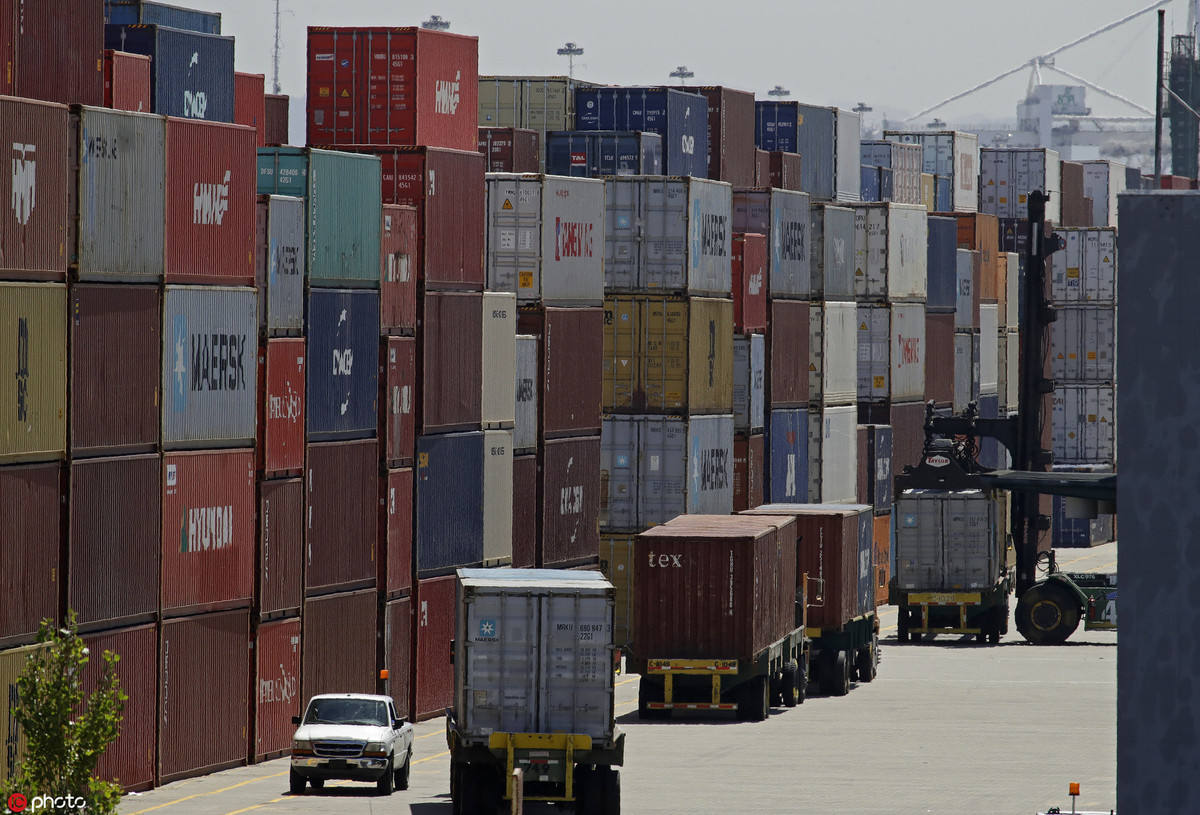6 ports send Trump letter on drain of tariffs


The Office of the US Trade Representative has acknowledged correspondence from the West Coast port community, an official at the Port of Oakland said Monday, after six of the ports sent a letter to the Trump administration that addressed their growing concern with the US-China trade standoff.
"The Port of Oakland is in favor of the flow of free and fair trade because it directly benefits our import and export partners and their workforces," Port of Oakland Maritime Director John C. Driscoll said in a statement to China Daily on Monday.
The uncertainty regarding tariffs is generating serious concerns among stakeholders as they try to plan, said the Port of Oakland, which together with its partners support 84,000 jobs in the region and indirectly 1.1 million jobs across the US.
Port of Long Beach Executive Director Mario Cordero said that while the port has yet to receive a response from the White House, its representatives have been in contact with the Trump administration, and the port is confident that its concerns are being heard.
"While there are very serious issues for the two sides to discuss, we know that international trade is vital to the economies of both countries. Both countries will benefit from a resolution of the dispute," he said.
Officials at the ports in Washington expressed similar sentiment.
"Trade is critically important to The Northwest Seaport Alliance and to the state of Washington, particularly Sino-US trade. China is our largest trading partner, and we deeply value our relationships with customers there," said Tong Zhu, chief commercial officer and chief strategy officer of the Northwest Seaport Alliance, which comprises the ports of Seattle and Tacoma.
In the letter dated Sept 23, the six largest West Coast ports — the Port of Los Angeles, Port of Long Beach, Port of Oakland, ports of Seattle and Tacoma, and the Port of Portland, warned that the escalating trade conflict between the two countries "will create irredeemable economic harm".
"US trade policy impacts not only our core businesses, but also the success of our customers and the livelihoods of our local communities. Collectively, our trade and logistics operations employ hundreds of thousands of family-wage workers whose jobs rely on dependable trade flows," the ports wrote.
The letter outlined the ports' concern about the impact that the tariffs have on US exporters, adding that 38 percent of all US exports to China by value go through the six ports alone.
California is the largest exporter to China of any state in the nation, the letter stated. However, California ports collectively saw a decrease of about 30 percent in exports to China.
The letter specifically pointed out the impact the tariffs have had on certain commodities. For example, exports to China of wheat, which were grown across 10 states from the Pacific Northwest to the Midwest and exported via Washington and Oregon ports on the Columbia River, have nearly ceased this year.
In California, soybean exports to China have declined 96.9 percent; grain exports fell 85.5 percent; glass exports dropped 86.5 percent; and rubber plunged 74.9 percent.
In Washington, several other goods have taken a hit, including exports of potatoes (-16.85 percent), hay (-49.93 percent), skins and hides (-47.89 percent), salmon (-47.71 percent), cherries (-54.56 percent) and fresh crab (-63.34 percent).
The effect of the US-China tariff is also evident at the Port of Long Beach. While exports to other countries increased 10 percent, exports to China fell 41.1 percent during the first half of 2019, compared with the first half of 2018, the port's data shown.
In addition, imports from China are down 19.3 percent during the first half of 2019, while imports from other countries are up 14.3 percent.
"About 2.6 million jobs in the US are connected to the Port of Long Beach. We're concerned about the workers, businesses and other stakeholders that depend on trade. The port is an economic engine that powers the supply chain far and wide, and we are concerned that a prolonged trade dispute could cause lasting damage to that economic potential," Cordero said.
In the letter, the ports said they were worried that "the negative impact to these exporters will be long-lasting, because they cannot easily find new customers outside of China now that existing ones are being lost".
For example, Oregon accounts for nearly all the hazelnuts grown in the United States – half of which are shipped to China. Retaliatory tariffs could price Oregon growers out of the market and push Chinese consumers toward hazelnuts grown by Turkey.
Other products facing similar jeopardy included: Washington dairy, California grapes and "hundreds of other commodities", according to the ports.
The letter came in just a couple of weeks before trade negotiators between China and the US are set to engage in the next round of negotiations.
A high-level talk between Chinese Vice-Premier Liu He, US Trade Representative Robert Lighthizer and Treasury Secretary Steve Mnuchin is set to begin Thursday to resolve the trade war between the two nations.
"We support a balanced trading relationship with our global partners but are deeply concerned that the continued imposition of ever-increasing tariffs leads to higher costs on US businesses and consumers and loss of valuable markets without any long-term strategic benefit," the ports said in their letter.
Linda Deng in Seattle contributed to this story.

































